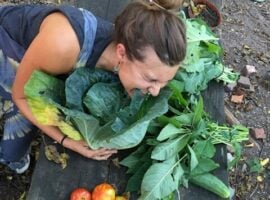 A new publication from the National Farm to School Network (NFSN) was recently released, written with contributions from WhyHunger’s Brooke Smith, Co-Leader of the Grassroots Action Network, and WhyHunger partners including the Delta Fresh Foods Initiative (DFFI), Alma Maquitico and Edwin Marty. Intended to be used as a guide to develop and standardize farm to school program evaluations across the country, the publication, “Evaluation for Transformation: A Cross-Sectoral Evaluation Framework for Farm to School,” provides a theoretical and practical framework accessible by policymakers, teachers, funders, researchers and program staff. Brooke and partners were invited by the publication’s team to contribute a food justice lens, an opportunity to enhance the core message of long-term systemic change within the academic language and research processes that often marginalizes or leaves out grassroots voices.
A new publication from the National Farm to School Network (NFSN) was recently released, written with contributions from WhyHunger’s Brooke Smith, Co-Leader of the Grassroots Action Network, and WhyHunger partners including the Delta Fresh Foods Initiative (DFFI), Alma Maquitico and Edwin Marty. Intended to be used as a guide to develop and standardize farm to school program evaluations across the country, the publication, “Evaluation for Transformation: A Cross-Sectoral Evaluation Framework for Farm to School,” provides a theoretical and practical framework accessible by policymakers, teachers, funders, researchers and program staff. Brooke and partners were invited by the publication’s team to contribute a food justice lens, an opportunity to enhance the core message of long-term systemic change within the academic language and research processes that often marginalizes or leaves out grassroots voices.
“We need a paradigm shift toward justice being a natural part of the research and evaluation conversation,” Brooke says. “The ‘norm’ is a often a dominant-culture, top-down methodology, which leaves out the communities that will be impacted by these projects. The people this research is ‘serving’ should at the very least be on the team that determines how to evaluate the changes in their own community.” The final collaboration incorporates a food justice lens in the curricula for farm to school programs, recognizes community-based research methodology such as storytelling as valid, and addresses systemic issues like ensuring fair wages and equitable treatment of food service workers and farmworkers.
Anecdotal and qualitative evidence, like storytelling, are rarely included in academic frameworks, and this document suggests that story collection should be done to engage a more relevant spectrum of audiences. Quantitative evidence is a vital determinant of change, but isn’t traditionally used as a stand-alone tool to mobilize communities and build movements; qualitative tools are needed to balance out the hard data. Both are needed because together they form a truer, more complete understanding of reality in our communities and help point the way to solutions. This new farm to school framework begins to represent this perspective.
“We’re proud to be engaged in the process,” Brooke says, “and we’re excited to see more interest in these qualitative research strategies supporting long-term change.”





